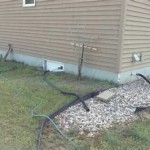How To Get Rid Of Large Spiders In Basement Taiwan 2024
The presence of large spiders in basements is a common concern, particularly in regions like Taiwan where the humid subtropical climate can provide favorable conditions for various spider species. In 2024, homeowners in Taiwan continue to grapple with this issue, requiring effective strategies for spider control and prevention. Understanding the factors contributing to spider infestations, identifying common species, and implementing appropriate measures are crucial for maintaining a pest-free basement environment. This article provides a comprehensive guide on how to address large spider infestations in basements in Taiwan, focusing on practical and sustainable solutions.
Taiwan's climate, characterized by high humidity and warm temperatures, creates an ideal habitat for many spider species. Basements, often cooler and darker than other parts of a house, offer refuge and a consistent environment. Cracks and crevices in foundations, unsealed windows, and poorly maintained drainage systems provide easy access points for spiders to enter. Additionally, basements often harbor insect populations, which serve as a primary food source for spiders. The combination of shelter, food, and access makes basements a prime location for spider activity.
Several factors can exacerbate spider infestations in basements. Clutter provides spiders with numerous hiding places, making them difficult to detect and eliminate. Poor ventilation can increase humidity levels, further attracting spiders and other pests. Insufficient sealing of entry points allows spiders to move freely in and out of the basement. Neglecting regular cleaning and maintenance allows spider webs and egg sacs to accumulate, leading to a larger and more persistent spider population.
Identifying Common Large Spider Species in Taiwan
Accurate identification of spider species is essential for implementing targeted control measures. While many spider species are harmless, some can deliver painful bites or trigger allergic reactions. In Taiwan, several large spider species are commonly encountered in basements. Knowledge of their characteristics and habits allows for a more effective approach to their management.
One of the most common large spiders in Taiwan is the huntsman spider (Heteropoda venatoria). These spiders are known for their size, reaching up to 12 inches in leg span. They are generally brown or gray in color and are characterized by their long, sprawling legs. Huntsman spiders are active hunters and do not build webs to capture prey. While their appearance can be intimidating, they are not considered dangerous to humans, although their bite can be painful. They primarily feed on insects and other small invertebrates.
Another large spider frequently found in basements is the wolf spider (Lycosidae family). Wolf spiders are also hunting spiders, meaning they do not rely on webs to catch their prey. Instead, they actively pursue insects and other small creatures. They are typically brown or gray and can be quite large, although sizes vary depending on the species. Female wolf spiders are known to carry their egg sacs attached to their abdomen and, after the spiderlings hatch, carry them on their backs for a period. Wolf spider bites can be painful but are generally not medically significant.
Cellar spiders, also known as daddy long-legs spiders (Pholcidae family), are commonly found in basements worldwide, including Taiwan. While not as physically imposing as huntsman or wolf spiders, they can create extensive webs in corners and along ceilings. Their long, thin legs and small bodies make them easily identifiable. Cellar spiders are generally harmless to humans and feed on insects and other small spiders. Their presence can be considered a nuisance due to the unsightly webs they create.
Less common, but still present in some areas, are orb-weaver spiders (Araneidae family). These spiders are known for their intricate, circular webs. While they typically prefer outdoor environments, they may occasionally venture into basements in search of prey. Orb-weaver spiders are generally harmless to humans, but their webs can be a nuisance. Identifying the specific species present is important for determining the best course of action.
Implementing Preventative Measures
Preventing spider infestations is often more effective and less disruptive than dealing with an established population. Several preventative measures can be implemented to reduce the likelihood of spiders entering and establishing themselves in basements.
Sealing cracks and crevices in the foundation and around windows is a crucial step in preventing spider entry. Using caulk or sealant to close off potential access points can significantly reduce the number of spiders entering the basement. Pay particular attention to areas where pipes and wiring enter the building, as these often create gaps that spiders can exploit. Regularly inspect the foundation for new cracks and address them promptly.
Maintaining proper ventilation in the basement helps to reduce humidity levels, making it less attractive to spiders and other pests. Consider installing a dehumidifier to control moisture levels, particularly during the humid months. Ensure that the basement is well-ventilated by opening windows or using ventilation fans when appropriate. Proper ventilation also helps to prevent mold and mildew growth, further contributing to a healthier basement environment.
Removing clutter from the basement provides spiders with fewer hiding places and makes it easier to detect and eliminate them. Store items in tightly sealed containers to prevent spiders from nesting inside. Regularly clean and organize the basement to remove spider webs and egg sacs. Dispose of unwanted items promptly to reduce potential harborage areas.
Maintaining a clean and well-maintained outdoor environment around the foundation can also help to reduce spider populations. Trim vegetation away from the building to eliminate potential pathways for spiders to enter. Remove piles of leaves, wood, and other debris that can provide shelter for spiders and other pests. Consider using outdoor lighting that is less attractive to insects, as insects are a primary food source for spiders.
Effective Spider Control Strategies
When preventative measures are not sufficient, or when a spider infestation is already present, targeted control strategies may be necessary. These strategies can range from non-chemical methods to the judicious use of pesticides. The choice of method should depend on the severity of the infestation, the species of spider involved, and the homeowner's preferences.
Vacuuming is a simple and effective method for removing spiders, webs, and egg sacs from basements. Use a vacuum cleaner with a hose attachment to reach into corners, along ceilings, and behind furniture. Dispose of the vacuum bag or empty the canister immediately after vacuuming to prevent spiders from escaping. Regular vacuuming can significantly reduce spider populations and prevent them from establishing a foothold.
Sticky traps can be used to capture spiders and monitor their activity. Place sticky traps in areas where spiders are commonly seen, such as along walls, near windows, and in corners. Check the traps regularly and replace them as needed. Sticky traps can be particularly effective for capturing ground-dwelling spiders like wolf spiders and huntsman spiders. While sticky traps are not a complete solution, they can help to reduce spider populations and provide valuable information about the extent of the infestation.
Diatomaceous earth (DE) is a non-toxic, naturally occurring substance that can be used to control spiders and other pests. DE is made from the fossilized remains of diatoms and is abrasive to the exoskeletons of insects and spiders. Sprinkle DE in areas where spiders are commonly seen, such as along walls, under furniture, and in cracks and crevices. DE is most effective when dry, so it may need to be reapplied periodically. While DE is generally safe for humans and pets, it is important to avoid inhaling the dust.
In some cases, the use of pesticides may be necessary to control severe spider infestations. However, pesticides should be used judiciously and according to the manufacturer's instructions. Choose a pesticide that is specifically labeled for spider control and apply it only in areas where spiders are known to be present. Consider using a crack and crevice treatment to target spiders hiding in hard-to-reach areas. Always wear appropriate protective gear when applying pesticides and ventilate the area thoroughly afterwards. Consider consulting with a professional pest control company for assistance with pesticide application, particularly if you are not comfortable handling chemicals yourself. Professional pest control companies have the knowledge, experience, and equipment necessary to safely and effectively control spider infestations.
Natural remedies, such as essential oils, can also be used to repel spiders. Peppermint oil, eucalyptus oil, and tea tree oil are known to have repellent properties. Dilute a few drops of essential oil in water and spray the mixture around the basement, focusing on areas where spiders are commonly seen. Reapply the spray regularly to maintain its effectiveness. While essential oils are not as potent as chemical pesticides, they can be a safe and natural alternative for repelling spiders.
Maintaining Long-Term Spider Control
Achieving long-term spider control requires a combination of preventative measures, targeted control strategies, and ongoing monitoring. Regular inspections of the basement can help to detect spider activity early and prevent infestations from becoming established. Continue to seal cracks and crevices, maintain proper ventilation, and remove clutter to create an unfavorable environment for spiders. Regularly clean and vacuum the basement to remove spider webs and egg sacs.
Consider implementing a regular pest control program to address not only spiders but also other pests that may be attracting them. Controlling insect populations can help to reduce the food source for spiders, making the basement less attractive. Work with a professional pest control company to develop a customized program that meets your specific needs and addresses the pest challenges in your area.
Educate yourself about spider behavior and identification to better understand the risks they pose and how to effectively control them. Stay informed about new developments in pest control technology and techniques. By taking a proactive approach to spider control, homeowners in Taiwan can successfully manage spider populations in their basements and maintain a pest-free environment.

How To Get Rid Of Spiders In Your Basement

How To Get Rid Of House Spiders Removal And Exclusion Pest Pros

How To Deal With A Spider Infestation In Your Basement Peachtree Pest Control

How To Get Rid Of Spiders Nextgen Pest Solutions

How To Get Rid Of Spiders The Home

How To Get Rid Of House Spiders Removal And Exclusion Pest Pros

How To Get Rid Of Wolf Spiders From Your Home For Good

How To Get Rid Of Spiders The Home

10 Types Of House Spiders

Large Spiders In Ohio







